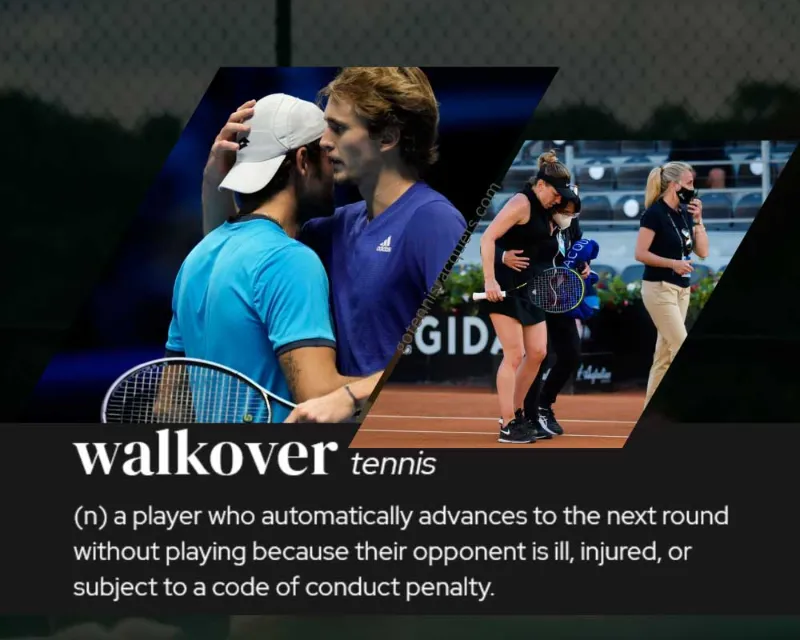What Does Walkover in Tennis Means?

In tennis, a walkover (also known as a “walk” or a “WO”) occurs when a player is unable to compete in a match and their opponent is awarded the win without playing. This can happen for a variety of reasons, including injury, illness, or even personal circumstances.
A walkover can happen either before the match starts, usually because of a player withdrawal, or during the match, in the event a player is unable to continue.
When a walkover happens before the match, the player who withdrew from the match is typically said to have “defaulted”. The reasons for this can range from injuries, illness, personal reasons, to even no show. When a walkover happens during a match, the remaining player will get the win.
Walkovers can happen at any level of play, from amateur tournaments to professional Grand Slam events. It’s rare, but it does happen. In general, tournament officials and referees will use their discretion when deciding whether to award a walkover in a match. They will consider the specific circumstances of the situation, as well as any relevant rules and regulations.
Walkovers can have a big impact on a tournament, as the remaining players advance without having to play a match and this could be considered an unfair advantage, especially in the case of early round walkovers. Therefore, tournament organizers have implemented a series of rules to avoid players retiring and giving a walkover when they are capable of playing.
Walkover in Tennis Rules & Consequences
In tennis, the rules and consequences for a player who receives a walkover can vary depending on the level of play and the specific tournament or event. Here are a few examples of common rules and consequences for players who receive a walkover in tennis:
- Professional tennis tournaments: At the professional level, the rules for walkovers are generally outlined in the tournament’s code of conduct. In general, players can be penalized for giving a walkover for non-valid reasons, for example if they’re not injured, and can face fines, point penalties, or even disqualification from the tournament. Additionally, players may be required to reimburse the tournament for any expenses they incurred while they were scheduled to play.
- ITF Junior tournaments: At the ITF Junior level, players can face point penalty and fines, and in some cases suspension. They might also be required to reimburse tournament expenses.
- USTA tournaments: The USTA has a no-retirement policy. If a player retires, they will lose the match and also face penalties such as fines, suspension or even being banned from future USTA tournaments.
It’s worth noting that the rules and consequences can vary depending on the event or league, tournaments can have different policies and can be more or less strict. Also, in some cases, a player may be allowed to return to the tournament after a certain period of time if their injury or illness has healed.
It’s important to note that giving a walkover should not be taken lightly, as the consequences can have a significant impact on a player’s career, both financially and in terms of their ranking and reputation.
Walkover By Top Tennis Players
It’s not a common thing among professional players, especially the top players, to give walkovers in their career, but here are a few examples of professional tennis players who have given walkovers:
- Roger Federer: Roger Federer has given walkovers in his career, once in the Dubai Tennis Championship in 2016 due to a stomach virus, and again in the Shanghai Masters in 2016 due to a back injury.
- Rafael Nadal: Nadal has given walkovers on a few occasions, most notably at the 2017 Miami Open due to an ongoing knee injury and at the 2019 Wimbledon due to an injury in his left knee.
- Novak Djokovic: Djokovic has given a walkover in the past, most notably at the 2020 Paris Masters due to an injury he sustained during the tournament.
- Serena Williams: Serena Williams withdrew from the 2021 French Open due to an Achilles injury, it is considered a walkover on her part.
It’s worth noting that top players usually have a lot to lose by giving walkovers, as it can affect their ranking, prize money, and reputation. Therefore they try to avoid giving walkovers as much as possible and if they have to, they usually do it due to an injury or an illness.
Tennis Walkover vs Withdrawal
| Walkover | Withdrawal |
|---|---|
| Player is unable to compete in a match and their opponent is awarded the win without playing. | Player decides to withdraw from a match before it starts, typically due to injury, illness, or personal reasons. |
| Player may face penalties such as fines, point penalties, or disqualification from the tournament. | Player may face penalties such as fines, point penalties, or loss of prize money, and also may lose ranking points. |
| Usually happens due to injury, illness, or personal reasons | Usually happens due to injury, illness, or personal reasons |
| Can happen during or before the match | Happens before the match |
| Opponent is awarded a win | Opponent is awarded a walkover win |
It’s worth noting that in some cases a withdrawal before the match can be considered a walkover when the player is capable of playing. Giving a walkover or withdrawing from a match should not be taken lightly, as the consequences can have a significant impact on a player’s career, both financially and in terms of their ranking and reputation.
Tennis Walkover vs Retirement
| Walkover | Retirement |
|---|---|
| Player is unable to compete in a match and their opponent is awarded the win without playing. | Player stops playing during a match due to injury, illness, or personal reasons |
| Player may face penalties such as fines, point penalties, or disqualification from the tournament. | Player will lose the match and may face penalties such as fines, point penalties, or suspension |
| Usually happens due to injury, illness, or personal reasons | Usually happens due to injury, illness, or personal reasons |
| Can happen during or before the match | Happens during the match |
| Opponent is awarded a win | Opponent is awarded a match win |
As with walkovers, retirements happen because of an injury, illness, or personal reasons that prevent the player from continuing the match. Giving a walkover or retiring should not be taken lightly, as the consequences can have a significant impact on a player’s career, both financially and in terms of their ranking and reputation. It’s also important to note that many professional tournaments have a “no-retirement” policy in place, which means that players are not allowed to retire from a match and will face penalties for doing so.
Faqs Related to Walkover in Tennis
Q: What is a walkover in tennis?
A: A walkover, also known as a “walk” or a “WO,” occurs when a player is unable to compete in a match and their opponent is awarded the win without playing.
Q: Why do walkovers happen in tennis?
A: Walkovers can happen for a variety of reasons, including injury, illness, or personal circumstances.
Q: What are the rules for walkovers in professional tennis tournaments?
A: The rules for walkovers in professional tennis tournaments are generally outlined in the tournament’s code of conduct. Players can be penalized for giving a walkover for non-valid reasons, and may face fines, point penalties, or even disqualification from the tournament. Additionally, players may be required to reimburse the tournament for any expenses they incurred while they were scheduled to play.
Q: Can players return to a tournament after giving a walkover?
A: In some cases, a player may be allowed to return to a tournament after a certain period of time if their injury or illness has healed. However, this can depend on the specific rules and regulations of the tournament or event.
Q: How do walkovers affect a player’s ranking and reputation?
A: Giving a walkover can have a significant impact on a player’s ranking, prize money, and reputation. It may result in penalties like fines and point penalties, which can affect a player’s standings in the rankings and their earning potential. It may also damage their reputation if they’re seen as having given a walkover for non-valid reasons.
Tennis rules: Retirement, Default, and Walkover explained
Conclusion
Walkovers are considered a last resort and are usually given due to injury, illness, or personal reasons, and it’s usually rare for players to give walkovers for other reasons. The WTA has a no retirement policy, which means that players are discouraged from giving walkovers and will usually face penalties for doing so.
It’s important to note that walkovers can have a big impact on a tournament, as the remaining players advance without having to play a match. And it can also affect the player that has given the walkover in terms of ranking, prize money, and reputation as well.

As someone who enjoys both playing tennis and writing, I strive to embody a combination of skillful technique and unwavering perseverance on the court while simultaneously offering valuable observations and reflections to my audience through my articles. My overarching objective is to motivate and encourage others on their individual paths towards tennis success.


![Tennis Elbow Symptoms & Treatment [Surgical or Non-Surgical]](https://gotennisracquets.com/wp-content/uploads/2020/12/Tennis-Elbow-Symptoms-Treatment-Surgical-or-Non-Surgical-768x622.jpg)
